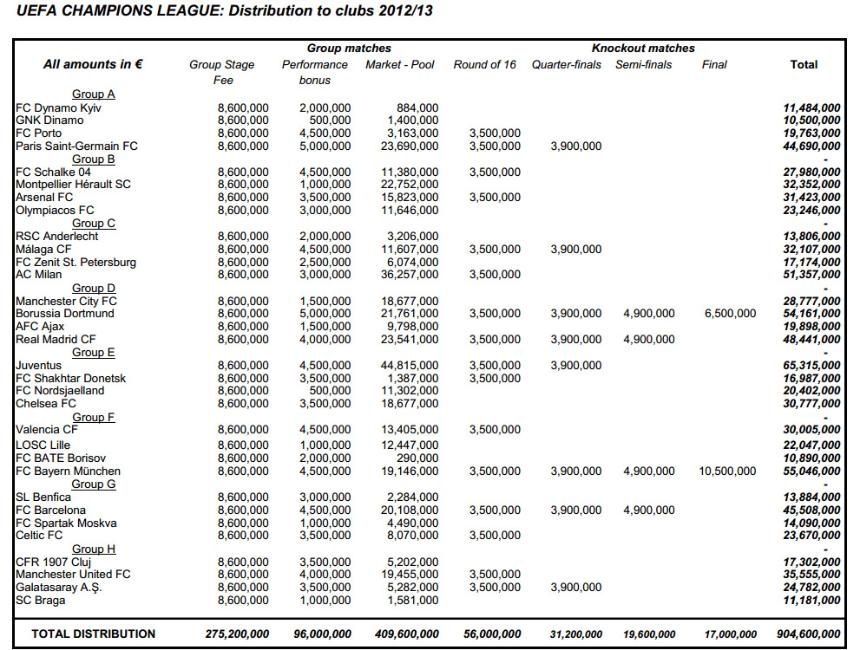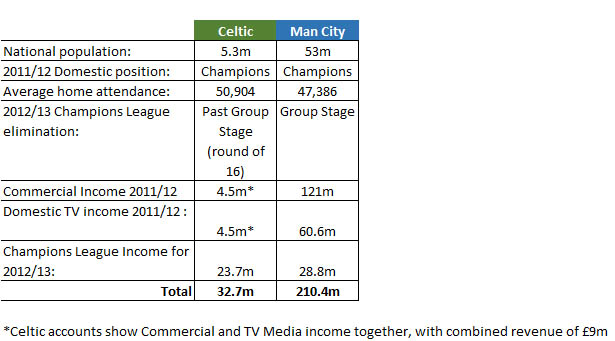Widening gap between elite clubs and 'the rest'
Immediately after last night’s set of rather predictable Champions League results the excellent Nick Harris fromwww.sportingintelligence.com tweeted an interesting comment on FFP’s impact on the Champions league. Nick made a very valid point; the gap between the elite European clubs and ‘the rest’ appears to be widening:

This is an interesting point and raises a number of issues which are worth exploring (including the reasons behind this inequality, and the role of FFP).
Although many would like to see a more exciting Champion League, UEFA’s FFP rules were never intended to make football more competitive. The FFP rules are intended to bring greater stability and sustainability to European Football. With a number of clubs getting into financial difficulty and overspending to chase success, UEFA is aiming to reduce insolvency events and ensure clubs balance their incomings with their outgoings. FFP is aimed at ensuring clubs balance their books, rather than making it more competitive. Clubs with larger incomes will always be able to spend the most money on players - although this might viewed as somehow ‘unfair’, it is something FFP was never intended to address. Indeed, it appears to be an inequality of income, rather than a restriction on club’s ability to spend, that is the underlying reason for a lack of competition.
Essentially, there are three main factors that contribute to this inequality of income.
Champions League income
One of the biggest causes of inequality between Champions League clubs is the UEFA distribution of the prize money.

Although clubs receive more revenue the further they progress in the competition, a significant component is the ‘TV Pool’. This element is essentially based on the TV revenue received from the relevant countries, split between the number of clubs competing for that country. Unfortunately this means that the larger the country’s population, the higher the revenue for their clubs. FC Braga from Portugal (population 10.5m and in the grips of economic austerity), received only 1.5m from the TV Pool, compared to Man City ( England population 53m) who received £18.7m). Clubs from countries with lower population such as Netherlands (16.7m) or Czech Republic (10.5m) will always continue to receive lower TV Pool payments. This, in turn, becomes self-fulfilling and the clubs from smaller countries are less likely to succeed in the competition and reap the financial rewards.
TV revenue (excluding UEFA payments)
A country’s population is a key factor in determining the amount of TV revenue it can receive. For example, Ajax’s last accounts show that they received around £24m from TV revenue), compared to the £65m that Liverpool received. Increasingly, overseas TV rights are becoming increasingly important. The inequality of TV deals can be seen as self-fulfilling - overseas fans will pay a premium to watch the talent on offer in the Premier League and would pay far less to watch the Dutch Eerste Divisie.
Commercial incomes
With the increased globalisation of football, the top tier of clubs are increasingly able to write significantly larger deals than their peers. Two factors are at play here; top clubs have become very effective at securing multiple sponsorship deals from around the globe; brands will pay a premium to be associated with the very top clubs. In revenue terms, this is widening the gap between to elite clubs and the rest.
The three factors outlined above can be illustrated using the example of Celtic and Man City:

Celtic, like other top Dutch, Portuguese, Belgium, Czech, Scandinavian clubs, are severely hampered by coming from a country with a low population.
FFP impact
The FFP rules should stop clubs overspending to achieve footballing success. In theory this should restrict clubs ability to post large losses in the hope of breaking into the elite. It should also restrict clubs being able to rely on a benefactor to fund club losses*. This has certainly restricted Manchester City and Chelsea’s ability to spend freely to buy success – although whether this makes for a less competitive or less interesting Champions League is open to debate.
*Paris Saint-Germain have pretty-much ridden roughshod over the rules and haven’t allowed FFP to restrict their spending – they are likely to receive their punishment in April 2014. One of last night’s results was the thrashing of Olympiakos by PSG. You could argue that in a true post-FFP world, such a result is less likely.
blog comments powered by Disqus
